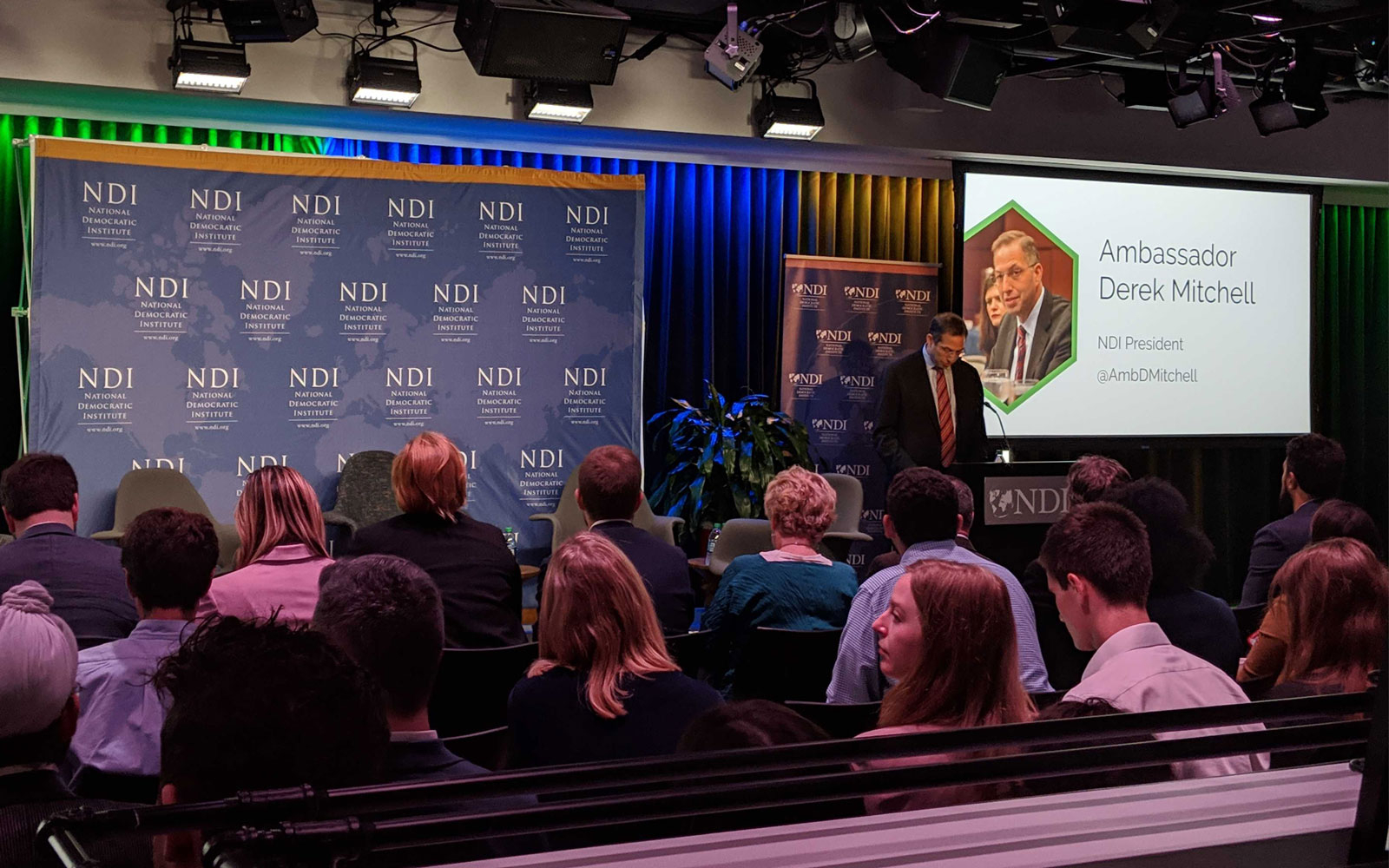
NDI President Derek Mitchell gives opening remarks at Google’s offices in Washington, D.C., during an event to launch the third generation of NDI’s DemTools – technology tools for civil society and government.
SHARE
ISSUES
Over half the world is now online. In this increasingly digital age, connected citizens expect to be able to engage with their democratic leaders the same way they talk to each other, do their shopping, and gather information: on the internet. However, critical political and civic institutions are often far behind the curve. Governments and civil society organizations have been slow to adopt digital tools to gather and analyze data, track information about their supporters, or contact citizens on their ever-present phones. In much of the developing world, this kind of software may be out of reach for anyone except the well-heeled – groups like oligarchs, incumbent governments or corporations with the resources to purchase and support cutting-edge technology.
"We cannot avoid the impact of digital technologies on 21st-century society,” said Derek Mitchell during opening remarks to introduce the third generation of NDI’s DemTools – technology tools designed to bridge this gap between civil society and government. “It's a fact of life that one cannot ignore. The only question is whether we harness its positive potential or decide simply to bemoan the negative applications whose results we see in the daily headlines."
DemTools is NDI’s initiative to adapt existing open-source software to fill the critical needs of its partners around the world: involving citizens in decision-making, helping civil society organize for change, managing election data, and pushing their message out to thousands of people at a time.
At a major event at Google’s Washington, D.C., headquarters on April 24, NDI highlighted the newest generation of DemTools. Updated features include a more user-friendly interface and new Facebook Messenger integration for contact management system Civi, SMS text-message integration for the citizen problem-reporting tool FixMyCommunity, easier deployment of the election data management system Apollo, and an entirely new civic education gaming platform, DemGames – complete with a Google Voice Assistant version.
“DemTools has been a great success for NDI’s partners, with hundreds of organizations able to access useful, low- or no-cost software to help them achieve their social change goals more effectively,” said NDI Chief Innovation Officer Chris Doten. “With this approach, we’ve assisted hundreds of civic, political and governmental groups around the world to be more effective in their work and estimate we’ve provided over a million dollars in value.”
The new features and products were developed in conjunction with NDI’s partners on the ground, listening to their needs and working to adapt solutions to their problems. This process, called human-centered design, is based on the insight that to be effective, technology must be built with – not just for – the people who will use it. The approach is central to software being developed by big corporations. Despite the overlaps with core principles of development, it is not frequently used in the democracy and governance space. To expand the conversation on human-centered design in the international development community, NDI convened a panel of experts to discuss the opportunities and challenges of using human-centered design in development.
DemTools is NDI’s effort to scale solutions to common challenges faced by NDI’s partners and permit the reuse of systems from program to program. By partnering with civic tech groups around the world, NDI has put human-centered design at the center of software development by working to leverage pre-existing communities, bringing the needs and experiences of our partners from the developing world to the table.
“Human-centered design is a practice that we all are representing and instilling in our work.” said Alexis Bonnell, USAID Chief Innovation Officer. “But at the end of the day, we’re saying ‘what would my expectation be? What would my experience be?’ And think about the experience of your users as being equally relevant whether in Africa or Poughkeepsie.”
Well-intentioned Silicon Valley software engineers are not likely to think of needs – let alone the human rights – of democracy organizations in smaller or more complicated markets like Malawi, Afghanistan, or Ukraine when building their software. Tools are often built in a way that makes sense to computer geeks, not democracy activists, and intended users are therefore unlikely to want to use it - much less share with others. This all changes when technology is built with the end-users from the beginning.
"By the time we get to the end of developing a tool, we have something that people understand, have used, have contributed to, feel some ownership of.” said Adam Fivenson, senior information and communications technology specialist at DAI. “And hopefully, if they have been part of the process, they'll actually help to promote [the tool] more broadly."
Through the DemTools initiative, NDI has been able to develop important features for our partners based on an understanding of their goals and needs. By taking advantage of NDI’s networks to work with communities in a variety of contexts around the world, we’re able to help far more people than proprietary tools designed to help one individual group. This approach is not only cheaper and more sustainable; it’s also more secure and therefore far less risky for high-stakes programs. Making the source code available to everyone ensures that the tools are available to help social entrepreneurs around the world, regardless of NDI’s involvement.
To learn more about the DemTools or to download the code, visit https://dem.tools.


